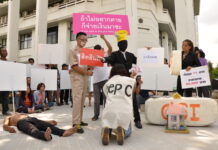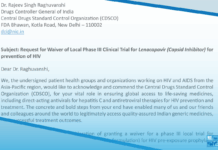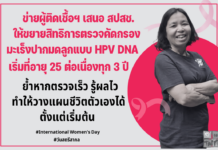Hepatitis C, a fatal but curable disease, is a global health concern. 700,000 people around the world died every year due to hepatitis C. 150 million people are living with the virus and cannot access effective medication with less adverse side effects. In Thailand, 1.4 millions are infected by hepatitis C virus (HCV) and are not treated.
At present we have a medicine, known as sobosbuvir, that can effectively treat hepatitis C infection. But its selling price is so expensive, USD 84,000 for 3-month medication (USD 1,000 per tablet).
Gilead has filed patent applications on sofosbuvir in many countries. Patent is the essential barrier preventing a great number of people living with HCV away from the effective treatment, as no other generic-drug manufacturers can produce and sell at lower prices.
However, patentability of sofosbuvir is questionable worldwide as it isn’t considered a newly invented drug and doesn’t use significantly innovative technology to produce. And, Gilead’s patent applications on sofosbuvir have been challenged in India and Europe.
Today 100 representatives of HIV and HCV networks, NGOs, and activists in Thailand joined the global action on access to HCV treatment on May 20, 2015. They had an action at the Ministry of Public Health calling the trade and health policy makers to take a lack of affordable and effective HCV medicine as a national health threat and to have remedial measure to address the challenge.
After the action, the Acting Undersecretary and the Deputy Minister of Public Health’s secretary came to received a letter from the protesters, on behalf of the Minister of Public Health who was at the World Health Assembly in Geneva. A copy of the same letter would be sent to the Minister of Commerce.
Below are the requests mentioned in the letter:
1) Department of Intellectual Property (DIP) must strictly apply the manual of the drug patent applications’ examination, which was approved in October 2013, to all the patent applications in order to prevent frivolous patents (known as ever-greening patents),
2) DIP must identify a clear timeframe of the patent examination process and openly disclose it to encourage monitoring by the public,
3) DIP must present patent applications’ information, when they are advertised, on the Department’s website on a timely basis and with complete information in order to facilitate opposition by stakeholders, and
4) Ministry of Public Health should take compulsory licensing (the government use) into account in order to address a lack of affordable and effective medicines for HCV infection’s treatment.










